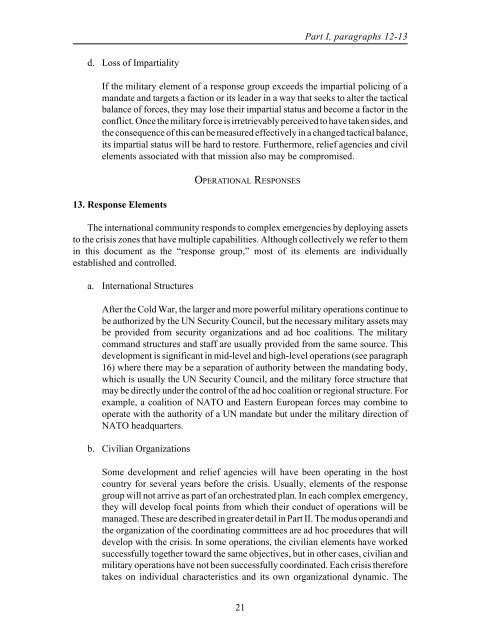a guide to peace support operations - The Watson Institute for ...
a guide to peace support operations - The Watson Institute for ...
a guide to peace support operations - The Watson Institute for ...
You also want an ePaper? Increase the reach of your titles
YUMPU automatically turns print PDFs into web optimized ePapers that Google loves.
Part I, paragraphs 12-13<br />
d. Loss of Impartiality<br />
If the military element of a response group exceeds the impartial policing of a<br />
mandate and targets a faction or its leader in a way that seeks <strong>to</strong> alter the tactical<br />
balance of <strong>for</strong>ces, they may lose their impartial status and become a fac<strong>to</strong>r in the<br />
conflict. Once the military <strong>for</strong>ce is irretrievably perceived <strong>to</strong> have taken sides, and<br />
the consequence of this can be measured effectively in a changed tactical balance,<br />
its impartial status will be hard <strong>to</strong> res<strong>to</strong>re. Furthermore, relief agencies and civil<br />
elements associated with that mission also may be compromised.<br />
OPERATIONAL RESPONSES<br />
13. Response Elements<br />
<strong>The</strong> international community responds <strong>to</strong> complex emergencies by deploying assets<br />
<strong>to</strong> the crisis zones that have multiple capabilities. Although collectively we refer <strong>to</strong> them<br />
in this document as the “response group,” most of its elements are individually<br />
established and controlled.<br />
a. International Structures<br />
After the Cold War, the larger and more powerful military <strong>operations</strong> continue <strong>to</strong><br />
be authorized by the UN Security Council, but the necessary military assets may<br />
be provided from security organizations and ad hoc coalitions. <strong>The</strong> military<br />
command structures and staff are usually provided from the same source. This<br />
development is significant in mid-level and high-level <strong>operations</strong> (see paragraph<br />
16) where there may be a separation of authority between the mandating body,<br />
which is usually the UN Security Council, and the military <strong>for</strong>ce structure that<br />
may be directly under the control of the ad hoc coalition or regional structure. For<br />
example, a coalition of NATO and Eastern European <strong>for</strong>ces may combine <strong>to</strong><br />
operate with the authority of a UN mandate but under the military direction of<br />
NATO headquarters.<br />
b. Civilian Organizations<br />
Some development and relief agencies will have been operating in the host<br />
country <strong>for</strong> several years be<strong>for</strong>e the crisis. Usually, elements of the response<br />
group will not arrive as part of an orchestrated plan. In each complex emergency,<br />
they will develop focal points from which their conduct of <strong>operations</strong> will be<br />
managed. <strong>The</strong>se are described in greater detail in Part II. <strong>The</strong> modus operandi and<br />
the organization of the coordinating committees are ad hoc procedures that will<br />
develop with the crisis. In some <strong>operations</strong>, the civilian elements have worked<br />
successfully <strong>to</strong>gether <strong>to</strong>ward the same objectives, but in other cases, civilian and<br />
military <strong>operations</strong> have not been successfully coordinated. Each crisis there<strong>for</strong>e<br />
takes on individual characteristics and its own organizational dynamic. <strong>The</strong><br />
21

















